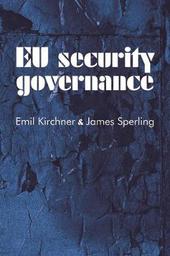
|
Eu Security Governance
Hardback
Main Details
| Title |
Eu Security Governance
|
| Authors and Contributors |
By (author) Emil Kirchner
|
|
By (author) James Sperling
|
| Physical Properties |
| Format:Hardback | | Pages:304 | | Dimensions(mm): Height 234,Width 156 |
|
| ISBN/Barcode |
9780719074684
|
| Classifications | Dewey:327.172 |
|---|
| Audience | | Professional & Vocational | |
|---|
| Illustrations |
Tables, black & white|Line drawings, unspecified
|
|
Publishing Details |
| Publisher |
Manchester University Press
|
| Imprint |
Manchester University Press
|
| Publication Date |
1 November 2007 |
| Publication Country |
United Kingdom
|
Description
EU security governance assesses the effectiveness of the EU as a security actor. The book has two distinct features. Firstly, it is the first systematic study of the different economic, political and military instruments employed by the EU in the performance of four different security functions. The book demonstrates that the EU has emerged as an important security actor, not only in the non-traditional areas of security, but increasingly as an entity with force projection capabilities. Secondly, the book represents an important step towards redressing conceptual gaps in the study of security governance, particularly as it pertains to the European Union. The book links the challenges of governing Europe's security to the changing nature of the state, the evolutionary expansion of the security agenda, and the growing obsolescence of the traditional forms and concepts of security cooperation. -- .
Author Biography
Emil Kirchner is Professor of European Studies and Jean Monnet Chair at the University of Essex. James Sperling is Professor of Political Science at the University of Akron -- .
Reviews"'EU security governance provides a broad and compelling overview of the diverse ways in which the European Union interacts with member states to provide internal and external security. The authors explore how the EU's growing role as a security actor has been driven by fundamental changes in the security agenda and how national sovereignty constrains EU activism. Finally they ask whether the EU is displacing the state in critical areas or is serving as a forum for intergovernmental bargaining. These are basic questions, and the erudite answers that Emil Kirchner and James Sperling provide will be of interest to all students of international relations.' Professor Gary Marks, University of North Carolina"
|